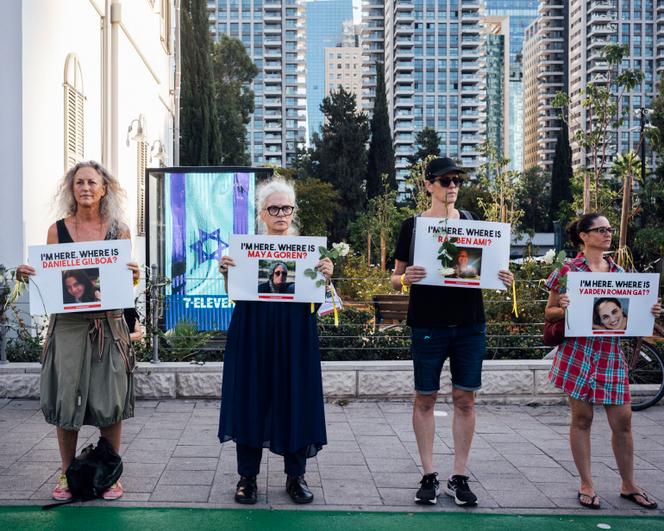


A long banquet table was set up outside, just opposite the Israeli military headquarters in the heart of Tel Aviv. It looked as if preparations were being made for a festive meal, under the sun that flooded the square. But the atmosphere of anxiety and anguish that seemed to have pervaded the whole country since October 7 gave away what the banquet was really for. Over 200 place settings were laid out, for the 200 hostages held by Hamas. Bottles of wine seemed ready to be uncorked and, at the end of the table, four colored baby bottles for toddlers, kidnapped by the terrorists along with their parents, were also waiting to be drunk. Hostage families, friends and neighbors stood in front of the empty chairs at this banquet without guests. The banquet was set up to remind the officers, sheltered behind the high walls of the military's headquarters, that it is the return of the Israeli's loved ones that must remain at stake, at a time when the government is distracted by a potential ground offensive in the Gaza Strip.
Three days after Hamas's attack, Avichai Brodetz, a 42-year-old father whose wife and three young children had been kidnapped, came with his brother to Kaplan Street, where young conscripts in uniform come and go, and set up shop to put pressure on the Ministry of Defense and, more broadly, on the government. He became the face of the hostage families in world media and was soon joined by hundreds of others. They now camp out day and night in front of the military buildings, striving to silence their differences, and sometimes their political disagreements, behind the single slogan that unites them, in Hebrew as well as English, Spanish, German and French: "Bring them home."
But nobody is quite sure what is the best solution. Most families are terrified at the thought of a military intervention to free the hostages. Hamas has already claimed that several captives were killed during Israel's intense bombardment of Gaza, which has also claimed the lives of almost 5,100 Palestinians in the space of two weeks, according to the health ministry in the Hamas-administered territory.
Swapping the hostages for prisoners is a debate that has divided Israel for years, with many still protesting the release of the soldier Gilad Shalit in 2011 in exchange for 1,000 Palestinian prisoners, 280 of whom had been sentenced to life imprisonment for homicide. Many of these prisoners, brandishing the "martyr" status that has united Palestinians for years, went on to become top Hamas fighters.
You have 57.18% of this article left to read. The rest is for subscribers only.
